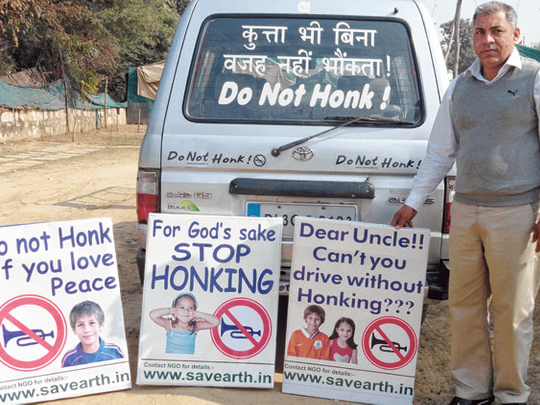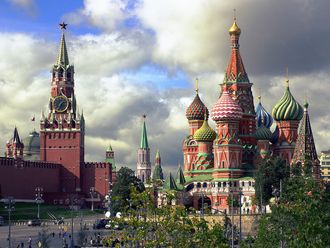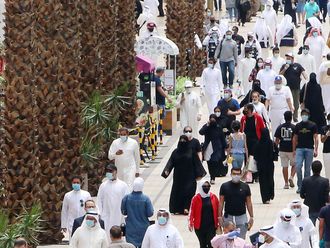
New Delhi: Making money has never been a passion with Ravi Kalra, a successful businessman at one time. Since social service remains his first love, he quit everything one day and has become a full-time environmentalist and social activist.
Founder of Earth Saviours Foundation (ESF), an NGO, which he founded in 2008, Kalra is working to serve the under-privileged and making all possible efforts to protect the environment. He treats every problem as a "small issue" in front of the colossal task he has undertaken for the rest of his life.
In 2009, he set a record of sorts by launching a drive for ‘no honking' in the city and express highways. Inspired by him, civic bodies like New Delhi Municipal Council and Municipal Corporation of Delhi decided to lend him support and soon enough ‘no honking' boards came up in several parts of the city.
Gulf News interviewed the environmentalist.
Gulf News: How was it getting both bouquets and brickbats for the ‘No Honking' drive that you launched three years ago?
RAVI KALRA: In our country, especially in Delhi, people honk even in the vicinity of hospitals, educational institutions and asylums. I wanted all this to stop. With eager like-minded volunteers, I set out removing the ‘Horn Please' signs from 100,000 commercial vehicles by painting these signs with black oil paint. Many times, I was beaten up along with my volunteers. Some people would lodge complaints against us in the police stations while we would be on the paint job!
Sensing that sterner action was required, we coined anti-honking slogans, which were both educative and powerful. We managed to create a no-honking day on January 1 and distributed thousands of bumper stickers with the words ‘Do Not Honk!' emblazoned across them. The other went — Kutta bhi bina wajah nahin bhonkta (Even a dog does not bark without a reason). It shamed many. Initially, the police did not understand, but over time, they began supporting us.
After this, was it easier to tackle the bus operators?
Our drive was against the use of pressure horns in buses. We punctured the tyres of several Blueline buses that are run in the city by private operators under the Delhi Transport Corporation scheme. This was very tough and our activists faced stiff resistance from the rustic drivers. But the endeavour eventually worked. The buses have finally removed the pressure horns.
Since you have taken up some ‘never ventured before' moves, what's next?
I have never confined myself to a particular aspect of environment. To save the planet, we need a multi-pronged attack. On World Environment Day (June 5), I campaigned for burning the dead bodies at electric or Compressed Natural Gas (CNG)-run crematoriums. One day, the relatives of a deceased person were about to light the pyre when we stopped and counselled them. Even at such a time, they listened to us and moved the body to the CNG crematorium ground. But there are also instances when the mourning relatives abuse us and think we are mad.
But what is the reason for suggesting such a move?
It's only after going into the nuances that I began urging people to save forests and trees. To cremate a dead body, a minimum of 300kg of wood is used. This not only adds to cutting of trees, but also pollutes air by producing carbon dioxide, carbon monoxide and other deadly poisonous gases. These gases can lead to diseases like asthma and tuberculosis in the young generation. I am not saying that any religious ceremony prior to or after the cremation should be stopped. My only concern is saving the forests for the sake of posterity. And for that, a change in people's mindset is required.
What roadblocks did you face in your mission to improve the lives of people?
When I decided to open a school for destitute children, the difference of opinion was with the board members of ESF. While they insisted upon charging fees, I was against it. After all, what does an NGO mean if we are taking money from the very people the institution is meant for? Then they said the elderly would have to pay to stay at the old age home we planned. So, the idea fizzled out many times and they left. But eventually, things did work out because I did not lose heart.
What is different in your school compared to other NGOs?
Children studying in our school are those who begged at traffic crossings. And persuading the parents of these children was a gigantic task. Most parents were also in the same trade and said that out of pity, people offered money to children easily. And if they did not beg, the families would starve. So, they said what use would education be then. It stumped me because I never thought of this. I saw logic in their point and promised jobs to parents on condition that they would educate their children.
Relying on a set of loyal friends, I was able to find placements for parents as drivers, helpers, cooks and maids. And starting with five children in 2009, the school, from nursery to Class 5, now has 125 children in the age group of 3-13, including some children who had never attended school before. For the school, I would give entire credit to young graduate and postgraduate volunteers, who spare their time to teach the children.
With meagre resources, how did you manage to open a home for the destitute and elderly?
I never thought of finances when I came across abandoned homeless men and women, some of whom were victims of rape and sexual abuse. Among the 40 people, there are some who were thrown out of their homes by their own children and others who were poor and had no place to call home and lived on the roadside and begged for food. All that these people need is to feel wanted. And I try my best to look after them.
How has the journey been ever since you established ESF?
Running the social service projects can sometimes be all-encompassing and drain the energies and financial resources. Since I do not get any financial assistance from the government or the corporate sector, the dependency is all on my own or individuals who help in their personal capacity.
Realising my dedication and spirit, a lot of people settled abroad have offered to send monetary help, but sadly, we still have to get clearance from several ministerial departments for receiving funds. Once that comes through, I hope to open at least ten properly constructed schools and provide free hostel accommodation and vocational education to the children.












